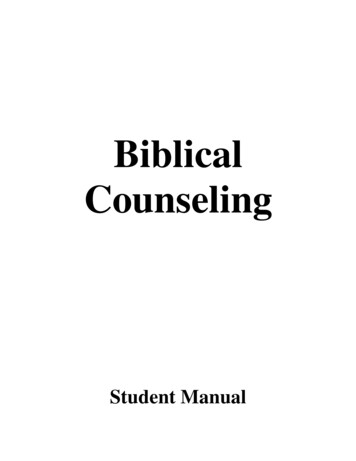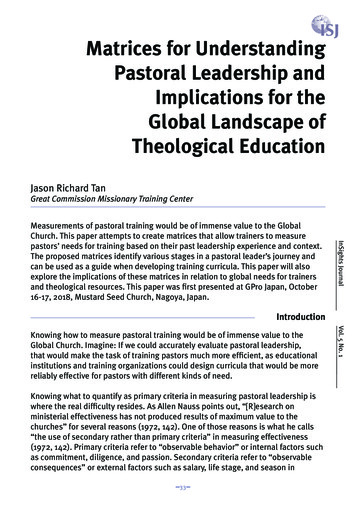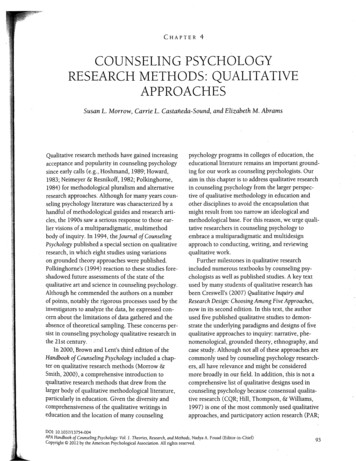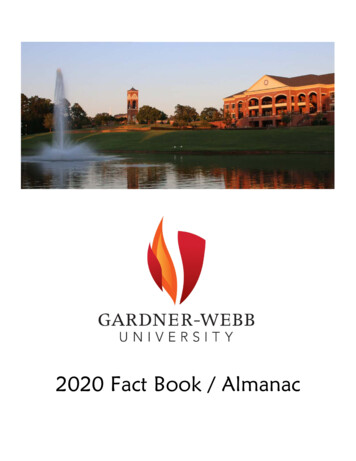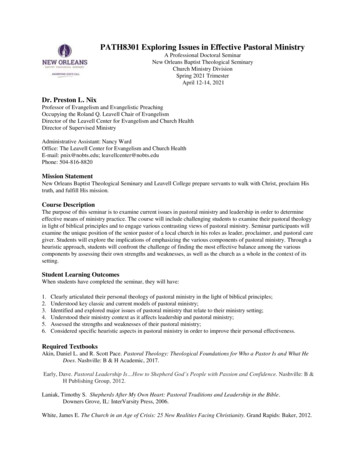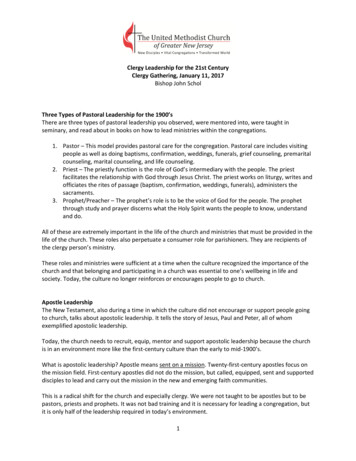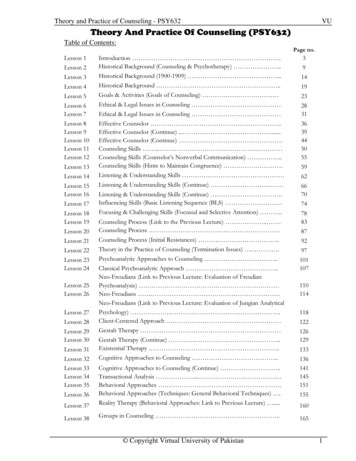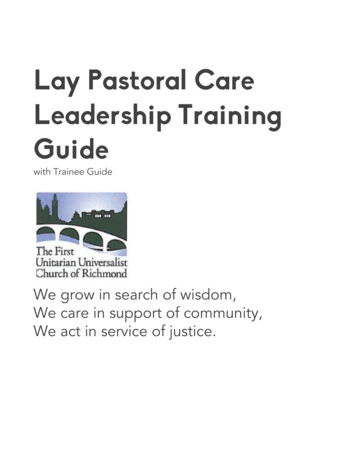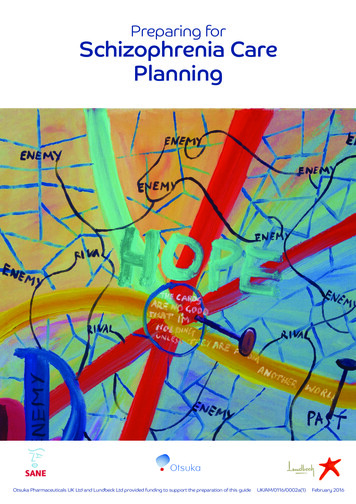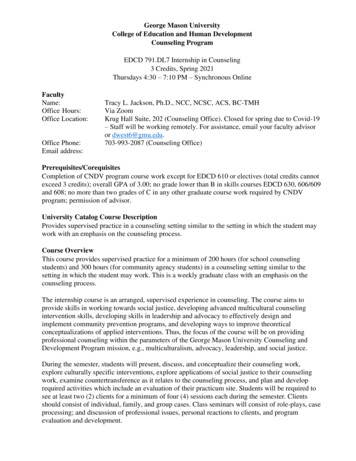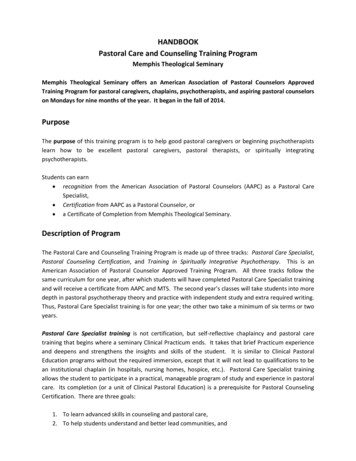
Transcription
HANDBOOKPastoral Care and Counseling Training ProgramMemphis Theological SeminaryMemphis Theological Seminary offers an American Association of Pastoral Counselors ApprovedTraining Program for pastoral caregivers, chaplains, psychotherapists, and aspiring pastoral counselorson Mondays for nine months of the year. It began in the fall of 2014.PurposeThe purpose of this training program is to help good pastoral caregivers or beginning psychotherapistslearn how to be excellent pastoral caregivers, pastoral therapists, or spiritually integratingpsychotherapists.Students can earn recognition from the American Association of Pastoral Counselors (AAPC) as a Pastoral CareSpecialist, Certification from AAPC as a Pastoral Counselor, or a Certificate of Completion from Memphis Theological Seminary.Description of ProgramThe Pastoral Care and Counseling Training Program is made up of three tracks: Pastoral Care Specialist,Pastoral Counseling Certification, and Training in Spiritually Integrative Psychotherapy. This is anAmerican Association of Pastoral Counselor Approved Training Program. All three tracks follow thesame curriculum for one year, after which students will have completed Pastoral Care Specialist trainingand will receive a certificate from AAPC and MTS. The second year’s classes will take students into moredepth in pastoral psychotherapy theory and practice with independent study and extra required writing.Thus, Pastoral Care Specialist training is for one year; the other two take a minimum of six terms or twoyears.Pastoral Care Specialist training is not certification, but self-reflective chaplaincy and pastoral caretraining that begins where a seminary Clinical Practicum ends. It takes that brief Practicum experienceand deepens and strengthens the insights and skills of the student. It is similar to Clinical PastoralEducation programs without the required immersion, except that it will not lead to qualifications to bean institutional chaplain (in hospitals, nursing homes, hospice, etc.). Pastoral Care Specialist trainingallows the student to participate in a practical, manageable program of study and experience in pastoralcare. Its completion (or a unit of Clinical Pastoral Education) is a prerequisite for Pastoral CounselingCertification. There are three goals:1. To learn advanced skills in counseling and pastoral care,2. To help students understand and better lead communities, and
23. To help students be better pastoral care-givers in their ministerial settings.At the end of a year's training our graduates will have received training in (1) how to do effective crisiscounseling, (2) how to do an effective pastoral diagnosis, (3) how to make appropriate referrals, (4) howto organize and teach effective parent education classes, and (5) understand the importance and use ofpersonal insight and authenticity in providing pastoral care.Pastoral Counseling training is training in psychotherapy that draws upon the insights of psychologyand theology. There are five goals:1.2.3.4.5.To help students become excellent psychotherapists who are skilled in the ethical integration ofspirituality in their clinical work and can articulate this skill clearly,To help students understand communities and become capable of helping communities claim orreclaim health and spiritual strength,Certification by AAPC (Graduates of this track, upon application to AAPC, will automaticallybecome an AAPC Certified Pastoral Counselor.),Preparation for a Tennessee license as a Clinical Pastoral Therapist, including the rights andprivileges of state credentials, andThe creation of a plan for developing a practice in pastoral or spiritually integrativepsychotherapy.Training in Spiritually Integrative Psychotherapy is the same as the Pastoral Counseling track withoutthe plan for becoming an AAPC Certified Pastoral Counselor (#3 above). Students on this track arepsychotherapists who are in the process of earning state licensure and seek to enhance and advancetheir skills, particularly in learning how to integrate spiritual and religious concerns into their clinicalwork.Schedule of Classes: Beginning in the Fall of 2014 classes are scheduled for Mondays in September through November, January through March, and May through July.First Year Classes will be from 3:00 – 7:30 PM. Second Year Classes will be from 4:00 – 8:30 PM. Classesare limited to eight students.Class Structures:(1) 3:00 - 4:00 pm (First Year) or 4:00 – 5:00 pm (Second Year): lectures and discussions on thereadings. This is traditional classroom work.(2) 4:00 - 5:30 pm (First Year) or 5:00 – 6:30 pm (Second Year): theory application/case conferenceconsultation, cases presented by students. Theology, theory, and science are applied to clinicalwork. Students’ clinical work is scrutinized by one another, the teachers, and insights are gainedin light of our studies. This experience counts as AAPC supervision for pastoral counselors intraining.
3(3) 5:30 – 7:00 pm (First Year) or 7:00 – 8:30 pm (Second Year): Interpersonal Growth Group(personal sharing and exploration). The evening is concluded with a “Dream Therapy Group”where the imagination and unconscious voices of God and the self are explored as an entrée todeeper sharing and growth. Assigned readings augment this group therapy experience.Writing Requirements: Every term each student is required to write papers on the readings as well as apaper at the end of the term meant to consolidate and capture what has been learned. As the studentnears completion of the two years, there will be a required Independent Study on a particularpsychological and theological theory and its clear application to the clinical hour. The program itselfembraces Existentialist Theology and Psychotherapy captured by Rollo May, Paul Tillich, James Hillman,John MacQuarrie, and others, and Bowen Family/Systems Theory taught by Edwin Friedman, Hal Runkel,David Schnarch, and others. Much of the readings will include their works, and the final paper on“Theology and Psychotherapy” will need to include significant understanding of these readings.Evaluations: The theory class will be graded on an A, B, C, D, F basis. Evaluations of written assignmentswill be based upon (1) Clarity of expression, (2) Mutuality (shared dialog on paper and in person), (3)Analysis of topics or books, (4) Application of theory to clinical work, and (5) completion of work by thedue date. At the end of each year the student will receive an evaluation in the manner of AAPCcertification evaluations. This evaluation will be shared with the student for approval or editingsuggestions, which the Director of the program will collaborate with. If there are disagreements thatcannot be ironed out, the students may ask for the help of the MTS Associate Dean of Academic Affairswho will follow the grievance policy of MTS.Student requirements: join the American Association of Pastoral Counselors (Student membership),read the assigned books and other readings, do case conference presentations each term, participate indiscussions and consultations with other students, do the required writing, be open and honest in grouptherapy (and keep confidence), participate in annual evaluations, seek personal therapy as needed andappropriate, and pay the tuition and fees. Students who, in the judgment of the training faculty, areunable to engage in these requirements, may be released from the program.Credentialing Outcomes: Students who complete a year of study earn recognition by AAPC as a PastoralCare Specialist, fulfilling one requirement for Certified Pastoral Counselor. Upon completing the twoyears of classes, students will have significant grasp of Existentialist Theology and Psychotherapy, andgraduates of the full two-year program in pastoral counseling will have met most of the educationalrequirements for Fellow in AAPC, met supervision requirements for Certified Pastoral Counselor, and,upon completion of 375 hours of clinical counseling (and an application to AAPC), will receiveCertification by AAPC. They may advance to Fellow in AAPC by continuing supervision and completing1000 more clinical counseling hours at which point they are but passing a Licensed ProfessionalCounselor test away from Tennessee Licensed Clinical Pastoral Therapist.Admission & TuitionAdmission requirements:
4(1) Students must have earned at least a Bachelor’s degree from an accredited college foradmission into the Pastoral Care Specialist program, and a Master’s in counseling or theologyfrom an accredited university or seminary for admission into the Pastoral Counseling, and be inor have earned a Masters program in counseling for admission into the Spiritually IntegrativePsychotherapy training program.(2) Complete an application.(3) Students must have demonstrated competency and aptitude in care and counseling.(4) Prospective students meet with the Director for an entrance interview.(5) Students must work in a counseling or pastoral care setting.Tuition & Costs: 1320 plus 80 student activity fee per year 1400 for the first term, 1320 for thenext two. Pastoral Counseling students will need to contract separately for personal supervisionfrom our approved supervisors ( 350-700), and may choose to purchase personal therapy – anadded cost determined by the negotiated fee of the supervisor or therapist ( 200-500). PastoralCare Specialist students complete the program in one year. Pastoral Counseling Students cancomplete the program in two years, although most students will take three to complete clinical andsupervisory requirements for American Association of Pastoral Counseling certification. Studentsseeking certification as Spiritually Integrative Psychotherapists can graduate in two years.Financial help: a small scholarship fund has been donated to the seminary to be divided in 250amounts to students with clear needs, and student loans are available.Application: The application fee is 40. Interested persons should contact Memphis TheologicalSeminary (901-458-8232 or www.memphisseminary.edu) and ask for an application form, which willinclude the following questions.1.2.3.4.5.6.7.8.9.10.Describe the salient points of development in your personal history.Describe your education.Describe your counseling experience.Describe at least two experiences that have helped you gain significant healing insight.Describe your vocational goals or dreams.Briefly, how does your religious life affect you?Please share three sentences that might summarize your personal theology.Describe your faith community.Why are you interested in this program?If you need financial assistance please providea. Statement of annual income (e.g., tax form, end of year pay stub, letter from employer).b. Amount you have in savings, your checking account, and investments.c. Outstanding financial obligations.d. Scholarships awards will continue throughout one’s training unless funding needs ofother students or limits on the scholarship funds require a change.
5Mid-Program Admission: Students may enter at mid-program terms if space allows and the TrainingDirector approves. Students who have to take a term or two off may resume training as spaceallows. Students who drop classes will not receive a refund. Students who fail will receive norefund.Process of Acceptance: The Training Director will read your application to determine if you should beinvited to an interview. (There is a 40 application fee.) The Training Director will contact you, andwill or will not invite you to an interview. After the interview the Training Director will or will notrecommend you to the Admissions Committee that will accept or deny admission. Upon fullacceptance into the program, you must complete a “Method of Payment Form” and work out thedetails of tuition and fees with Memphis Theological Seminary.Graduation Upon completion of Pastoral Care Specialist program requirements, the student will be sent astatement of recognition from the American Association of Pastoral Counselors (AAPC).Upon completion of Pastoral Counseling program requirements, the student will receive acertificate of completion from Memphis Theological Seminary and be eligible (upon formalapplication) for Certified Pastoral Counselor in AAPC.Upon completion of Training in Spiritually Integrated Psychotherapy, students will receive aCertificate from Memphis Theological Seminary.
6CurriculumFirst Year, First Term, Fall: September – NovemberMonday classes1. 3:00-4:00 PM – Creating Sanctuary Space & Pastoral Diagnosis: What are thefundamentals of counseling? How is pastoral care sanctuary space? How do weunderstanding complex problems? How do we keep records?Required Books:a. Ron McDonald, Building the Therapeutic Sanctuaryb. John Pruyser: Pastoral Diagnosisc. AAPC’s Ethics Statement2. 4:00-5:30 PM – Theoretical Application/Case Consultation: we will analyze how pastoralcare and counseling ideas are being applied to our clinical work by using verbatim reportsor recorded visits.3. 5:30-7:00 PM – Interpersonal Growth Group. We will analyze personal dreams,captivating stories, symbols, and metaphors in the context of shared intimacy. We willalso read James Hillman’s book, InSearch.First Year, Second Term, Winter: January – MarchMonday classes1. 3:00-4:00 PM – Development and Families: What are the challenges of development?What is the differentiated person?Required Reading:a. Alice Miller, Prisoners of Childhoodb. Rudolf Dreikur: Children: the Challengec. Edwin Friedman, Generation to Generationd. Hal Edward Runkel, Scream Free Parenting2. 4:00-5:30 PM – Theoretical Application/Group Supervision: we will analyze how pastoralcare and counseling ideas are being applied to our clinical work by using verbatim reportsor recorded visits.3. 5:30-7:00 PM – Interpersonal Growth Group: We will analyze personal dreams,captivating stories, symbols, and metaphors in the context of shared intimacy. We willalso read Jungian literature.First Year, Third Term, Spring/Summer: May – JulyMonday classes1. 3:00-4:00 PM – Crisis, Alcohol & Drugs and Marital Counseling: How do you handlepatterns of dysfunction, lies, and secrets?a. Bill W., Alcoholic Anonymousb. John Gottman, The Seven Principles for Making Marriage Workc. Ed Wimberly, Counseling with African American Couples and Families
72. 4:00-5:30 PM – Theoretical Application/Group Supervision: we will analyze how pastoralcare and counseling ideas are being applied to our clinical work by using verbatim reportsor recorded visits.3. 5:30-7:00 PM – Interpersonal Growth Group: We will analyze personal dreams,captivating stories, symbols, and metaphors in the context of shared intimacy. We willalso read Rollo May’s Love and Will.Second Year, Fourth Term, Fall: September – NovemberMonday classes1. 4:00-5:00 PM – Theology, Redemption, and Liberation in Counseling: What is theplace of meaning and courage in change? What really is forgiveness? How do wecope with and learn from cultural and social diversity?Required Reading:a. Paul Tillich, The Courage to Beb. John Patton, Is Human Forgiveness Possible?c. James Cone: A Black Theology of Liberation2. 5:00-6:30 PM – Theoretical Application/Group Supervision: we will analyze howpastoral care and counseling ideas are being applied to our clinical work by usingverbatim reports or recorded visits.3. 6:30-7 PM – shared meal (sack suppers)4. 7-8:30 PM – Interpersonal Growth Group: We will analyze personal dreams,captivating stories, symbols, and metaphors in the context of shared intimacy. Wewill read Jean Shinoda Bolen’s Goddesses in Every Woman or Gods in Every Man.Second Year, Fifth Term, Winter: January – MarchMonday classes1. 4:00-5:00 PM – Ethical Dilemmas and Complicated Problems: How do we find our waythrough the fog?a. Loren Townsend, An Introduction to Pastoral Counselingb. Rollo May: Power and Innocencec. Martin Luther King, Jr.: essays from James Washington’s compilation2. 5:00-6:30 PM – Theoretical Application/Group Supervision: we will analyze how pastoralcare and counseling ideas are being applied to our clinical work by using verbatim reportsor recorded visits.3. 6:30-7 PM – shared meal (sack suppers)4. 7-8:30 PM – Interpersonal Growth Group: We will analyze personal dreams, captivatingstories, symbols, and metaphors in the context of shared intimacy. We will read HowardThurman’s Disciplines of the Spirit.Second Year, Sixth Term, Spring/Summer: May – JulyMonday classes
81. 4:00-5:00 PM – Pastoral Theological Method, Insurance Issues, and State Expectations:What is unique about pastoral care and counseling? What do institutions and peopleexpect?a. Pamela Cooper-White: Shared Wisdomb. Diagnostic & Statistical Manual Vc. AAPC Certification Manual and State Licensing Requirements2. 5:00-6:30 PM – Theoretical Application/Group Supervision: we will analyze how pastoralcare and counseling ideas are being applied to our clinical work by using verbatim reportsor recorded visits.3. 6:30-7 PM – shared meal (sack suppers)4. 7-8:30 PM – Interpersonal Growth Group: We will analyze personal dreams, captivatingstories, symbols, and metaphors in the context of shared intimacy. We will also read RonMcDonald’s The Spirituality of Community Life.Final Project: Guided Study and Theoretical Integration: To complete requirements for the pastoralcare specialist, students have two choices: (1) take a fourth didactic class or (2) write an acceptablepaper summarizing what has been learned and how it will affect one’s continuing ministry. Pastoralcounseling students and spiritual integrative psychotherapist students will pick an approvedpsychotherapy theory to learn in depth, sharing insights and understanding with one another inpreparation for a final evaluation. Though students may work together, this will be each individualstudent’s key independent study. He or she is expected to develop exceptional understanding of afoundational theory of psychotherapy, how it is integrated into sound theological thought, andapplied to clinical practice.Final Evaluation & Consultation: a pastoral counseling or spiritual integrative psychotherapist studentpresents his or her best thinking and work for evaluation and consultation by the class andprofessor. This is an actual application process for AAPC certification, so AAPC guidelines for Fellowcertification paper and work sample will be followed.
9Historical, Cultural, and Theological ContextPastoral care is as old as religion itself, for humans from the beginning, aware of mortality andsuffering, called upon a higher power to help them through troubling times of loss or pain. Specialpeople with the gift of compassion and comforting words found the courage to minister to the dying andhurting. Religious training has long included listening skills, the reception of confession, thetransformation of insight, the wisdom of counsel. Over time pastoral care became the name for thisparticular ministerial gift, and some were so gifted they were seen as wise men and women, doing aform of pastoral psychotherapy to those in need. Psychology rose in part out of religion’s interest in thehuman psyche or soul.Freud was central in the rise of psychology, for he named what had been called “more thanmeets the eye” “the unconscious” and found ways to understand it more deeply. During the first half ofthe 20th Century Freudian psychoanalysis dominated the psychology field, opening up methods oftreatment that were ground-breaking. After World War II two auxiliary theories that were particularlyrelevant to pastoral ministry developed and grew: Jungian analytical psychology and family systemstheory and treatments. Meanwhile, with the rise of professionalism in the helping professions, pastoralcare grew into professional, specialized chaplaincy, and, as these special counselors were asked formore and more help, the pastoral counseling movement was born.Pastoral counseling took the historic traditions of pastoral care and combined them with tools ofpsychology and theology, including:1. Psychoanalysis’ recognition of unconscious mental processes and methods for lifting theminto consciousness;2. Jungian analytical psychology’s insights into the symbolic and mythological worlds;3. Family systems theories’ clear explanations for the family context of parishioners;4. The application of theology into an understanding of the spiritual, psychological, and sociallives of people.After World War II, pastoral counseling centers blossomed all over the United States, mostlyborn in church communities. In 1964 the American Association of Pastoral Counselors (AAPC) wasestablished to legitimize the profession and provide quality and uniform certification. Training programsgrew and AAPC membership became a way for pastors to make a living specializing in pastoralcounseling, often in churches, often now as independent standing institutions.AAPC and the pastoral counseling movement continued to grow well into the 1980s untilManaged Care entered the picture. Gradually insurance companies began to demand state licensure,refused to pay unlicensed pastoral counselors, and cut deals with licensed therapists for reduced fees.Aspiring pastoral counselors found that certification by AAPC was no longer an entry point for earning aliving as a pastoral counselor. Instead, the marketplace, which had grown apart from the originalreligious communities, mostly required a state license. Aspiring therapists began to turn away frompastoral counseling training towards degree based training that offered preparation for state licensureas professional counselors, clinical social workers, and psychologists. Pastoral counseling trainingprograms all over the country closed, and AAPC numbers shrunk.During the first decade of the 21st Century AAPC leadership moved away from offering trainingand certification as a sure way to be a successful pastoral counselor and shifted to offering training forestablished clinicians—particularly those with theological training—to become better therapists with
10skills in the integration of spirituality and theology into their clinical work. Seminaries began to take aninterest in training pastoral counselors, many developing Doctor of Ministry degrees with a specialty inpastoral counseling.Out of this context this training is being established with an eye for quality work in pastoral care,pastoral counseling, and spiritually integrated psychotherapy in a community context. We do notpromise automatic entry into the professional world of pastoral care or psychotherapy, but training as aPastoral Care Specialist can help a student represent the beloved community with quality pastoral care.In pastoral counseling we seek to help students prepare for (Tennessee) state licensure as a pastoraltherapist. Psychotherapists of all types can gain clarity and depth in fielding the spiritual and religiousconcerns that arise in their clinical work. Though the most direct route to becoming a psychotherapist isto take more traditional routes to licensure via university counseling psychology degree programs, weoffer a unique pastoral approach that integrates a way of being, soulfulness, and spirituality into thecounseling hour, while also affirming the importance of community life in psychological and spiritualhealth. We offer training that adds spiritual depth to what secular degree programs teach, helpingpastoral caregivers, pastoral counselors, and psychotherapists stay true to the pastoral “I-Thou”relationship that is the hallmark of community based pastoral therapy.The word “pastoral” refers to an ideal, simple, charming country life, the peaceful, protective,and contemplative shepherding of sheep, or, we might conjecture, shepherding of souls, which includesan awareness of the wolves that surround the peaceful life. A pastoral care-giver, a pastoral counselor,or a spiritually integrated psychotherapist is one who joins the troubled person at the point of pain andhelps mobilize the inner counselor to the aid of the troubled soul, giving voice to that of God within.They call people back into community, not just the marketplace or group life, but true, transformingcommunity life. It is a calling that cannot be lost, for it is as old as the first mother’s and father’s instinctto nurture. Yet it is a calling that can be diluted by our cultural worship of psychological explanationsthat uses diagnostic language under the domain of experts. Pastoral diagnosis is a common “country”and family language that speaks to the condition of the soul, to the voice of the Divine within. It is intune with the language of relationships, myths, symbols, and rituals (religious and cultural). We dependon the creation of a sanctuary for healing that requires insight, sensitivity to symbolic keys, and the useof soulful language to move the troubled individual, couple, or family in a new direction. It is this “IThou” sensitivity that we seek to develop, a way of contrasting expertise with the pastoral counselor’s“humble ignorance” and community experience that makes one a listener extraordinaire.Every educational endeavor must be about credo and praxis: theory and practice. So we will doour best to help students think clearly and practically. We seek to help students offer better pastoralcare, including greater insight into their own gifts and limitations. And we seek to develop betterpastoral counselors and spiritually integrating therapists.There are growing numbers of institutions that accept Pastoral Care Specialist training as afoundation for chaplaincy, and some religious institutions are opening up again to pastoral counselors orseeking spiritually integrative psychotherapists. We train Tennessee students to become LicensedClinical Pastoral Therapists, including how to negotiate with insurance companies to be on theirpreferred provider lists.Our pastoral care, pastoral counseling, spiritually integrative psychotherapy program is a selfreflective experience that helps students “know thyself,” find a vital place in community life, thinktheologically in applicable and ethical ways, and create a meaningful future by virtue of the acquired
11wisdom gleaned from careful and insightful listening. We seek to create a life-transforming learningcommunity that, for some, will lead them directly into pastoral care ministries, professional pastoralcounseling, and a special approach to psychotherapy.Recommendation:Joining this program is a major commitment. It has four components that will be emotionallyand intellectually challenging. (1) You will be transformed, and some of the transformation will bedifficult, albeit positive. (2) You will be challenged to think in new ways. Some of the readings will bedifficult, and writing requirements will be rigorous. (3) Your counseling work will be carefullyscrutinized, challenging you to have the courage to face your own blocks to listening well. (4) Westrive to create a learning community, and for a “group” to change into a true community,commitment, openness, and vulnerability are required.This program, we hope, will make you a more insightful person, both about yourself and thoseyou minister to or counsel with. We recommend it to you even as we ask you to carefully discern ifyou are ready for an immersion experience that will tax your time, your money, and your patience.We hope that the outcome will last you a lifetime. It won’t be easy.DirectorRon McDonald, D.Min., is a Tennessee Licensed Clinical Pastoral Therapist, a Diplomate in AAPC,currently the President of the Tennessee Association of Pastoral Therapists and the CertificationChair of AAPC. He is a pastoral counselor at the Church Health Center in Memphis and has a privatepractice. He is an adjunct faculty member of Memphis Theological Seminary, the author of fourbooks (Building the Therapeutic Sanctuary, Home Again, The Spirituality of Community Life, andWalking in Memphis), has recorded two CDs of children’s music and stories, is the leader of a bandnamed the EarthQuakers, and has been a speaker and teacher at many conferences on pastoralcounseling. He was educated at Union Theological Seminary (NYC), St. Paul School of Theology (KC,MO), and the Foundation for Religion and Mental Health (NY). He is a Quaker.Dr. McDonald’s foundational theories are the teachings of pastoral counselor John Patton (PastoralCounseling: A Ministry of the Church, and Is Human Forgiveness Possible?), psychoanalyst Rollo May(Love and Will, Power and Innocence and The Courage to Create), family systems theorist EdwinFriedman (Generation to Generation), parent educators Rudolf Dreikur (Children: the Challenge) andHal Runkel (ScreamFree Parenting), the liberation theology of James Cone (A Black Theology ofLiberation), and the ethical approaches of Martin Luther King. He integrates these with his interestin stories and music in what he calls “Back Door Approaches to Care and Counseling”: focusing onmetaphors and symbols in counseling.Guests Lecturers may include: Dr. William Walker; a Jungian pastoral counselor; Sylvia Landau, MSW,a local authority on the systems theory of Murray Bowen; Dr. Lee Ramsey, Professor of PastoralTheology at Memphis Theological Seminary; Don McDonald, M.D., psychiatrist; Dr. Ron Johnson,Pastoral Counselor; Chaplain Rev. Dennis Neenam, Dr. James Coffman, and other professionals.April 15, 2015
Apr 23, 2015 · Pastoral Counseling Certification, and Training in Spiritually Integrative Psychotherapy. This is an . personal insight and authenticity in providing pastoral care. . Analysis of topics
